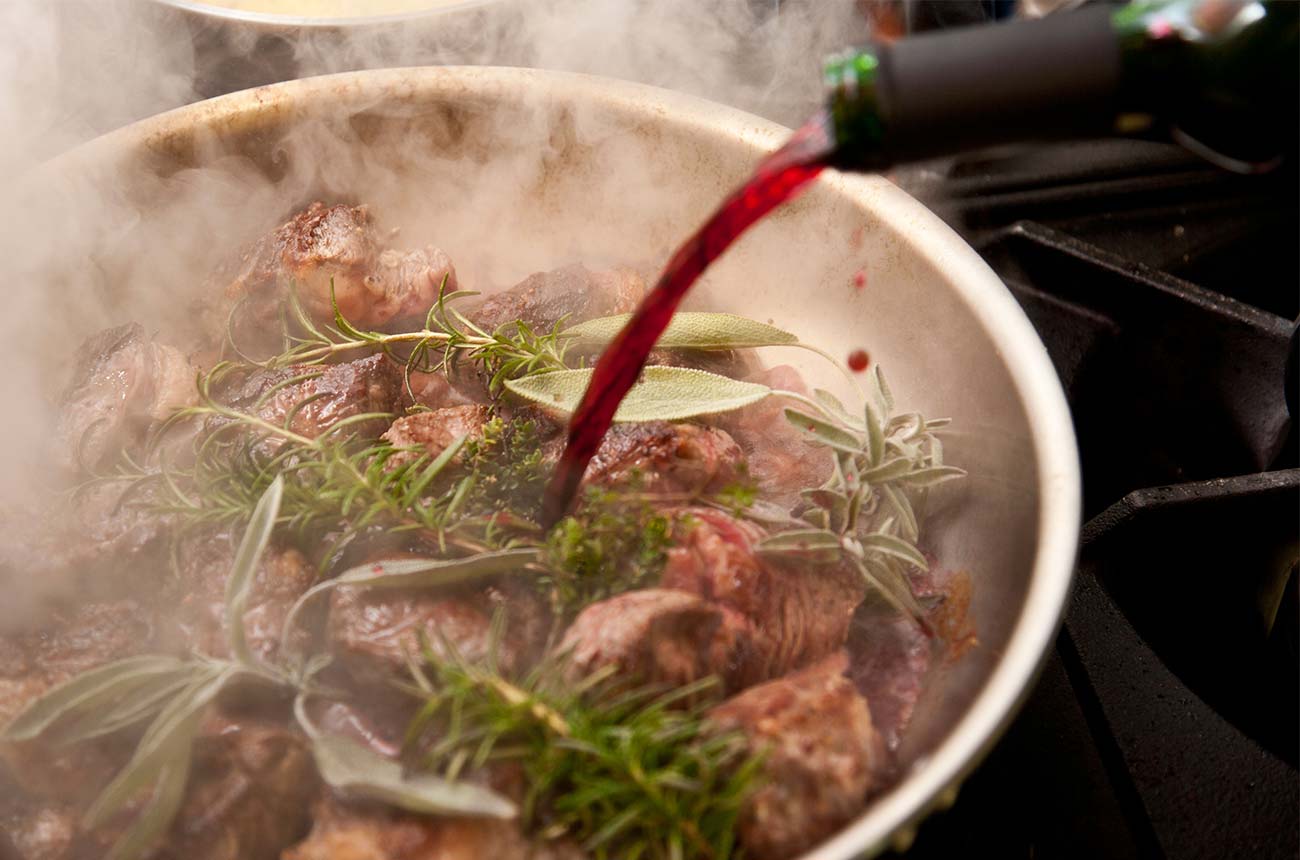
Expert advice on cooking with wine

Cooking with wine can really help enhance a dish, whether that’s adding some to a slow cooked meaty sauce, a splash as you start a risotto or even as a marinade.
But given how much thought goes into choosing wine to drink, how much should you think about which wines you cook with?
Best wine for cooking – and what not to use
‘The cardinal rule is if you wouldn’t drink it, you shouldn’t cook with it,’ said food and wine expert Fiona Beckett in Decanter magazine.
This is why you shouldn’t use corked wines in cooking. ‘The cork taint will come through in the finished dish.’
Avoid cheap ‘cooking wines’ say our experts, and stick to the level of wines you would tend to drink.
‘At best they won’t add anything to your finished dish, and at worst they’ll actively make it unpleasant,’ Pete Dreyer, food writer at Great British Chefs, previously told Decanter.com.
However, don’t feel you have to use an expensive wine, said Beckett, who wrote The Wine Lover’s Kitchen: Delicious recipes for cooking with wine.
A bottle around the £8 mark should be fine.
‘The only time to [use more expensive wine] is if a dish needs only a small amount of wine and you’d otherwise have to open another bottle,’ wrote Beckett in The Wine Lover’s Kitchen.
For example, her book includes a Champagne and mushroom risotto recipe.
‘It might seem wantonly extravagant…. But you need only a glass and the bonus is that you can drink the rest with the risotto.’
If you are going to use a separate wine for cooking with, you could take inspiration from the style you would drink with the dish, but go for a cheaper alternative.
‘An inexpensive Côtes du Rhône, for example, in a dish with which you’d drink a Gigondas,’ suggested Beckett.
If you’re worried about needing to open a bottle that then won’t be drunk, try this hack:
‘Freeze leftover wine in an ice cube tray and keep the cubes handy in a freezer bag to add to a dish,’ she wrote.
Cooking with white wine
Dishes that could use some white wine include risottos, white wine sauces (of course) or coq au Riesling.
As a starting point, crisp, dry, unoaked whites work well.
‘Pinot Grigio is really versatile – also Sauvignon Blanc; those are the two I would reach for first, and unoaked Chardonnay is fine,’ said Dreyer.
‘In most sauces, the most important thing is to consider the sweetness and acidity. As you cook off the alcohol and reduce the wine, both will become more pronounced, so you’re best off sticking to dry whites, with a reasonable amount of acidity.’
However, you could use a more aromatic variety if you wanted to.
Beckett wrote, ‘Wines with a pronounced aromatic character, such as Riesling or Gewürztraminer, are less flexible, but may turn out to be delicious with, for example, a creamy sauce. Feel free to experiment.’
Decanter‘s Sylvia Wu recommended a splash of ‘bone dry Riesling’ at the end of cooking fried rice.
‘Only to be added at the very end, and let the white blossom and sweet peach scents rise from the wok,’ she said.
Cooking with red wine
The best red wines to cook with are medium-bodied but not overly tannic, like Merlot or Grenache.
Tannins in wine become more concentrated as you cook them, so a tannic wine may dry out the dish or cause astringent flavours.
Red wine isn’t just for meaty sauces.
‘You might not think of pouring red wine into a risotto but with beetroot it works beautifully,’ suggested Beckett.
Dryer added, ‘It seems a bit weird, but it can work with flavours that traditionally accompany red wine – for example, mushroom risotto can work with red or white wine.’
Fortified wines, such as Sherry, Madeira and Marsala, are also great for cooking.
A small quantity adds strength, depth and often a welcome sweetness. Some recommend vermouth for risottos too.
If you cook with wine is there any alcohol left in the dish?
‘There is a widespread misconception that it all cooks out, but unless you’re cooking the dish for three hours or more there will be a residue – depending on how much wine you’ve used,’ said Beckett.
‘Worth bearing in mind if you’re cooking for kids or non-drinkers.’
Buy The Wine Lover’s Kitchen Amazon UK – £12.75 / Waterstones UK – £16.99 / Amazon US – $10.25 / Target US – $17.99</strong
